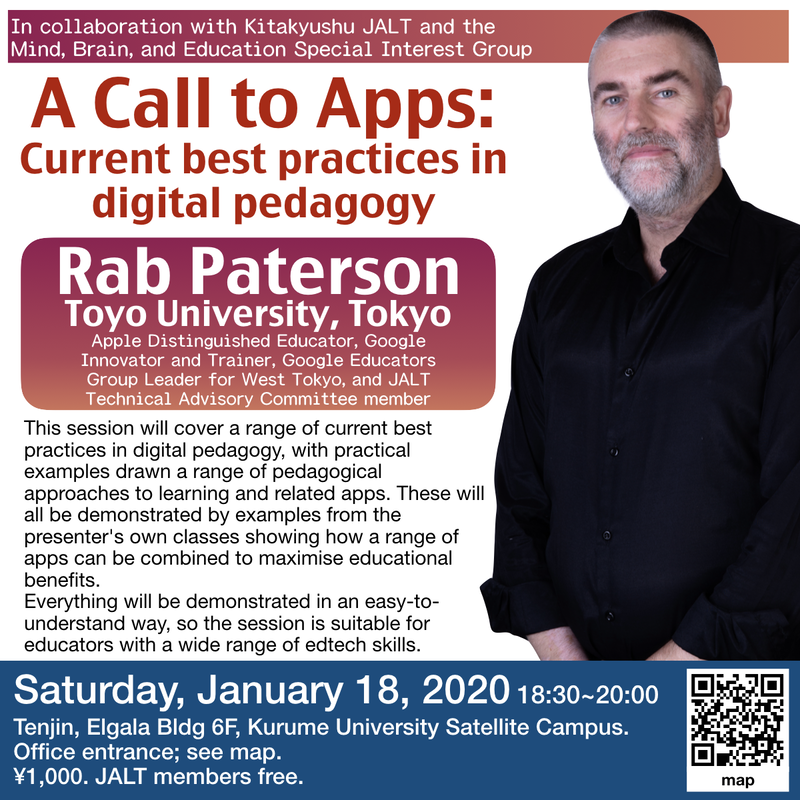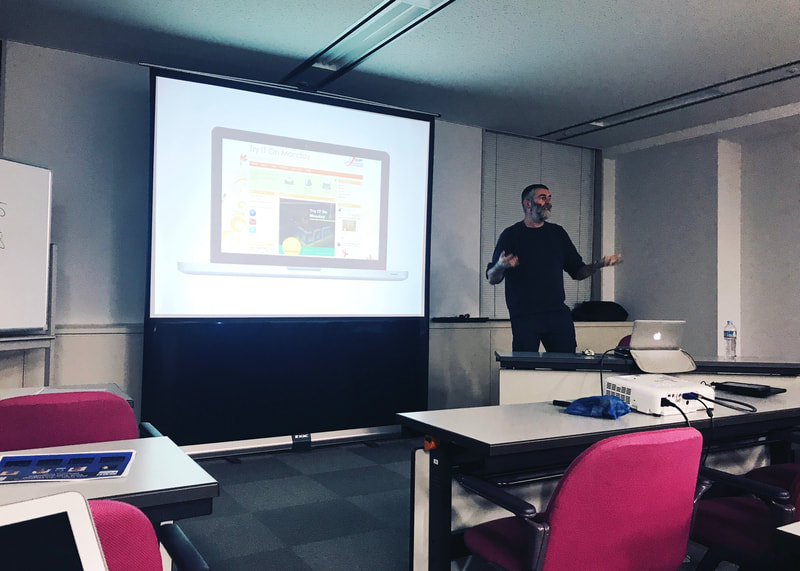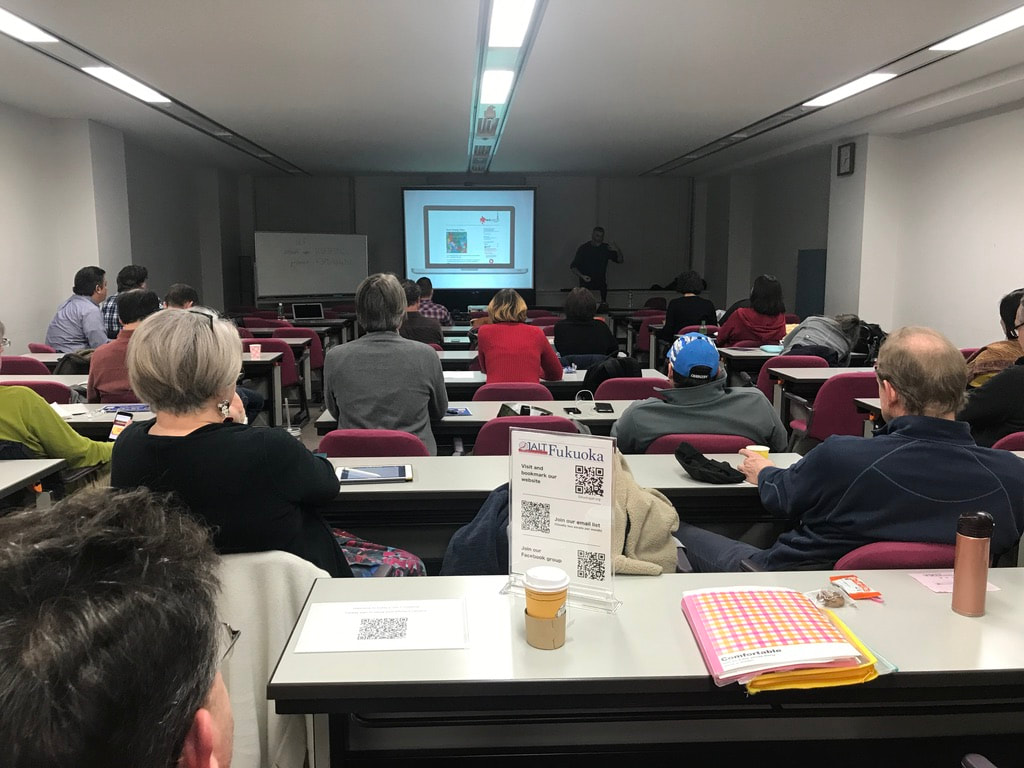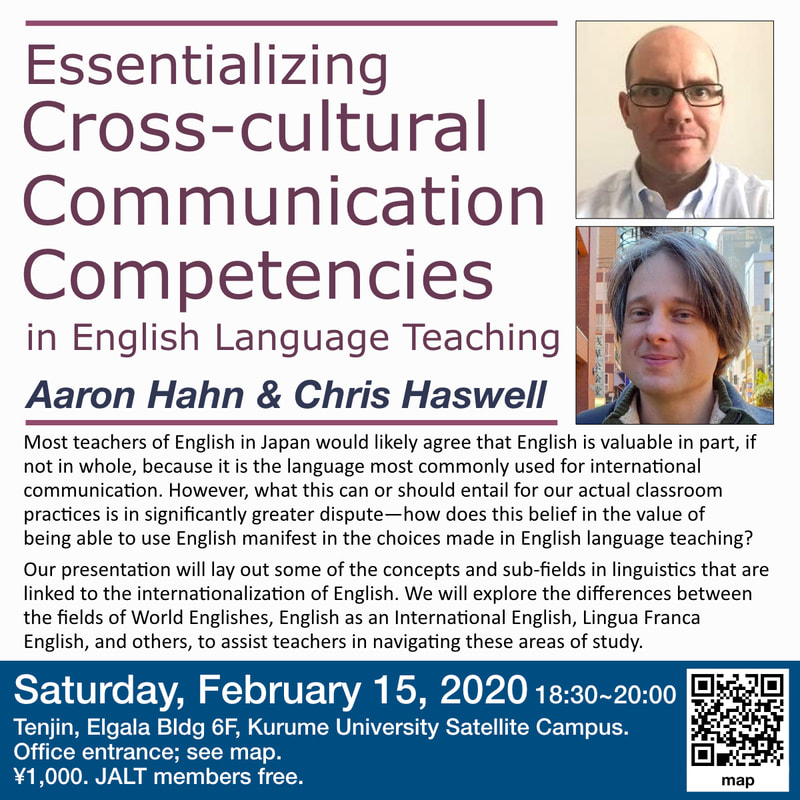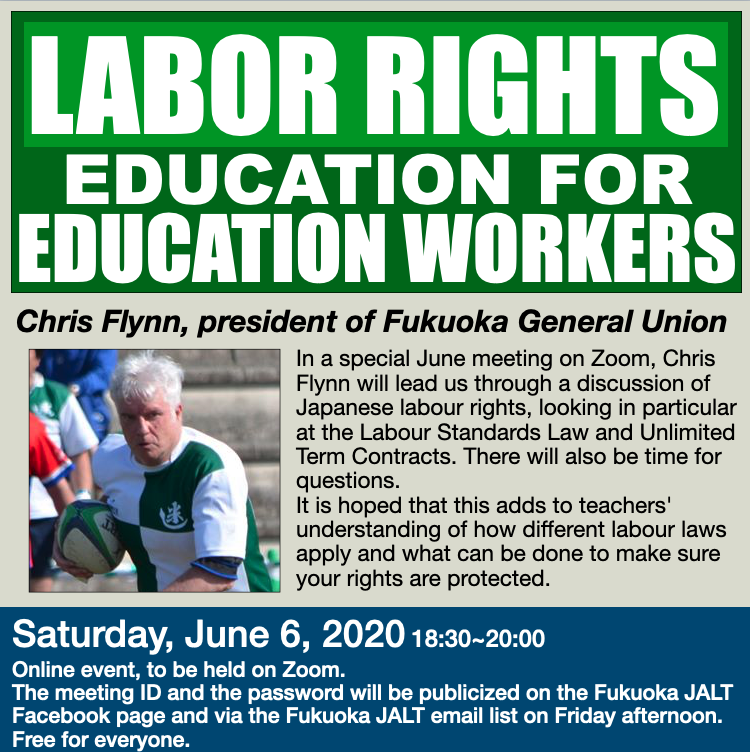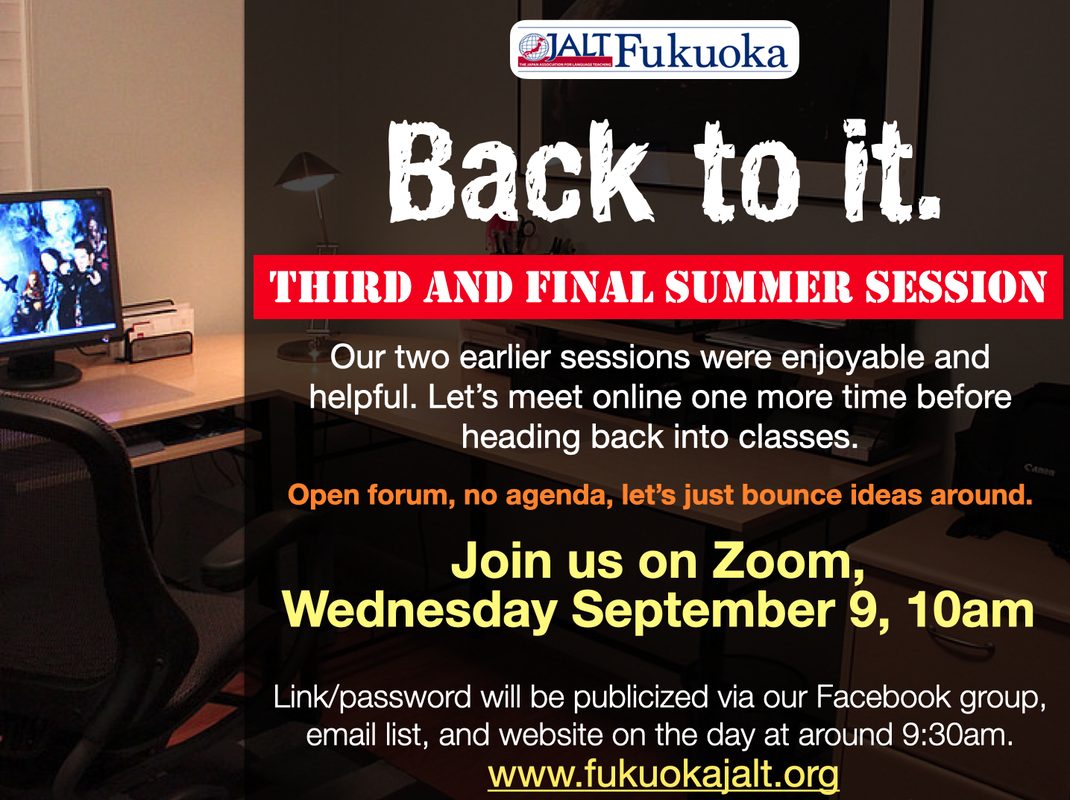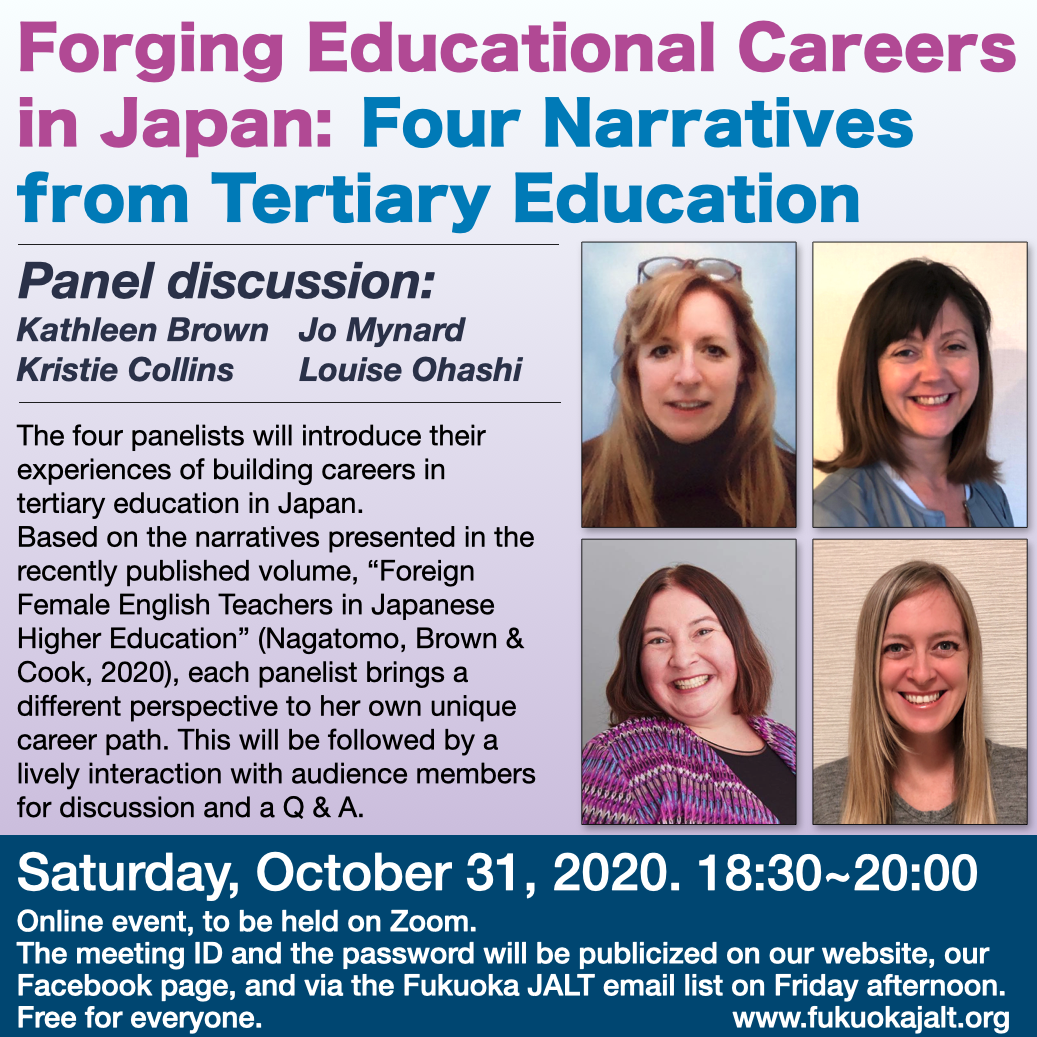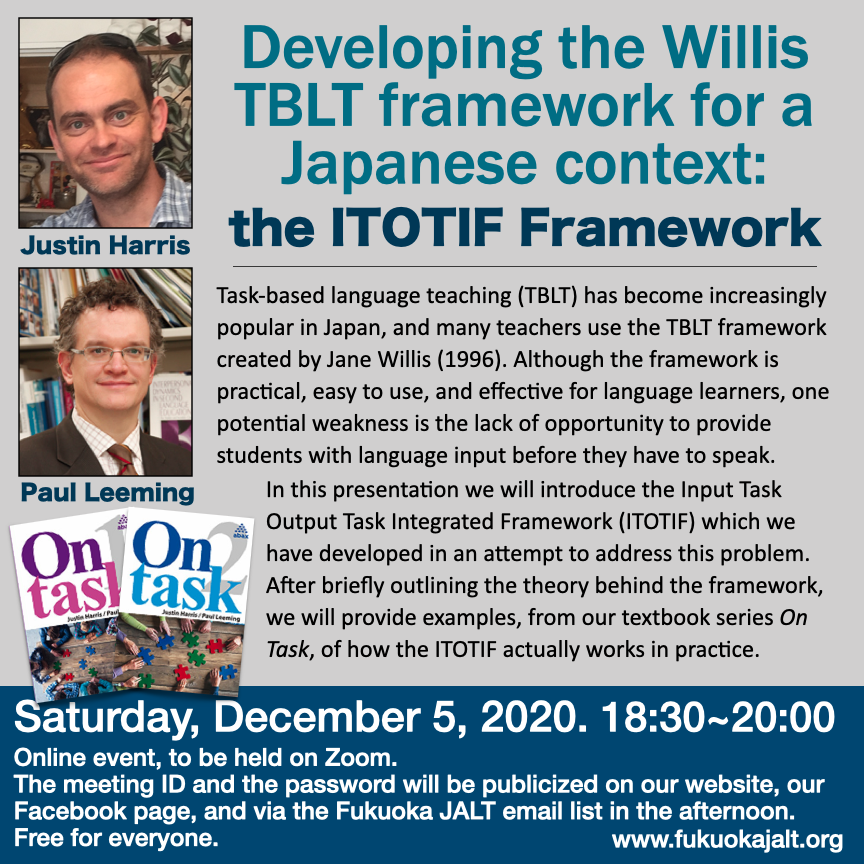Archive of 2020 Fukuoka JALT events:
January 18, 2020 (Saturday)
A Call to Apps: Current best practices in digital pedagogy
Rab Paterson (Toyo University, Tokyo)
6:30 pm start, doors will be open from 6:00 pm. Finishing around 8:00 pm
Venue: Tenjin: Kurume University Satellite Campus in the ELGALA building, next to Daimaru, near Tenjin Minami station. Use the south-east "Office" entrance. (See our locations page for a map image)
1,000 yen for non-members, JALT members free.
This session will cover a range of current best practices in digital pedagogy, with practical examples drawn a range of pedagogical approaches to learning and related apps. These will all be demonstrated by examples from the presenter's own classes showing how a range of Apps can be combined in an App Smashing way to maximise the educational benefits. However, this session will not just be a typical 'how to use apps' type workshop. The benefits to students in terms of their improved mind-brain learning as a rationale behind the adoption of these apps will also be covered, as will the motivational benefits for students that challenge / project based learning brings. Everything will be demonstrated in an easy to understand way, so the session is suitable for educators with a wide range of edtech skills. After the initial overview and demonstration, the session will become more hands-on and the instructor will go on to work directly with attendees* on how to set up and use these particular apps, and also illustrate how teachers can use them. The workshop will end with a more traditional Q and A session, although attendees are free to ask pertinent questions throughout the session.
Rab Paterson is the Principal Instructor for the International Affairs Office’s Business English Skills and Training (BEST) program at Toyo University. He's also the current Director of the Asia Association for Global Studies, a Fellow of The British Royal Asiatic Society, a Fellow of The Royal Society for the Encouragement of Arts, Manufactures and Commerce, and a member of the Japan Association for Language Teaching’s Technical Advisory Committee. Rab is also an Apple Distinguished Educator, an Apple Certified Teacher, a Google Innovator, Trainer, and Google Educator Group Leader for the West Tokyo GEG, and lives in a semi self-built, eco-friendly, sustainable lifestyle log-house of his own design in the foothills of the Japan Alps with his family, their two dogs and their goat!
A Call to Apps: Current best practices in digital pedagogy
Rab Paterson (Toyo University, Tokyo)
6:30 pm start, doors will be open from 6:00 pm. Finishing around 8:00 pm
Venue: Tenjin: Kurume University Satellite Campus in the ELGALA building, next to Daimaru, near Tenjin Minami station. Use the south-east "Office" entrance. (See our locations page for a map image)
1,000 yen for non-members, JALT members free.
This session will cover a range of current best practices in digital pedagogy, with practical examples drawn a range of pedagogical approaches to learning and related apps. These will all be demonstrated by examples from the presenter's own classes showing how a range of Apps can be combined in an App Smashing way to maximise the educational benefits. However, this session will not just be a typical 'how to use apps' type workshop. The benefits to students in terms of their improved mind-brain learning as a rationale behind the adoption of these apps will also be covered, as will the motivational benefits for students that challenge / project based learning brings. Everything will be demonstrated in an easy to understand way, so the session is suitable for educators with a wide range of edtech skills. After the initial overview and demonstration, the session will become more hands-on and the instructor will go on to work directly with attendees* on how to set up and use these particular apps, and also illustrate how teachers can use them. The workshop will end with a more traditional Q and A session, although attendees are free to ask pertinent questions throughout the session.
Rab Paterson is the Principal Instructor for the International Affairs Office’s Business English Skills and Training (BEST) program at Toyo University. He's also the current Director of the Asia Association for Global Studies, a Fellow of The British Royal Asiatic Society, a Fellow of The Royal Society for the Encouragement of Arts, Manufactures and Commerce, and a member of the Japan Association for Language Teaching’s Technical Advisory Committee. Rab is also an Apple Distinguished Educator, an Apple Certified Teacher, a Google Innovator, Trainer, and Google Educator Group Leader for the West Tokyo GEG, and lives in a semi self-built, eco-friendly, sustainable lifestyle log-house of his own design in the foothills of the Japan Alps with his family, their two dogs and their goat!
A great presentation and a great turnout.
February 15, 2020 (Saturday)
Essentializing Cross-cultural Communication Competencies in English Language Teaching
Aaron Hahn (Fukuoka University) and Chris Haswell (Kyushu University)
6:30 pm start, doors will be open from 6:00 pm. Finishing around 8:00 pm
Venue: Tenjin: Kurume University Satellite Campus in the ELGALA building, next to Daimaru, near Tenjin Minami station. Use the south-east "Office" entrance. (See our locations page for a map image)
1,000 yen for non-members, JALT members free.
Most teachers of English in Japan would likely agree that English is valuable in part, if not in whole, because it is the language most commonly used for international communication. However, what this can or should entail for our actual classroom practices is in significantly greater dispute—how does this belief in the value of being able to use English manifest in the choices made in English language teaching? This question is complicated by the fact that researchers working most closely on the matter have a wide variety of terms, stances, and principles (linguistic, pedagogical, ethical, among others), not all of which are prima facie compatible with one another.
The intent behind our research projects has been to bring together the theoretical and practical elements of various approaches to this field of linguistics. In furtherance of this goal, our presentation will lay out some of the concepts and sub-fields in linguistics that are linked to the internationalization of English. We will explore the differences between the fields of and terminology used in World Englishes, English as an International English, Lingua Franca English, and others, to assist teachers in navigating the often discordant waters of these areas of study. We will discuss examples of how researchers have attempted to apply these ideas in the classroom, and where we see these fields progressing in the future. In the second half of the presentation, we will extend the discussion to the issue of linguistic modeling, including a brief history and an analysis of the problems implicit in many prior models of English. Then, we will present our Global Model of English, which we believe addresses the major flaws in prior models. Finally, we will discuss our current and planned future work on taking the lessons of the Global Model and applying them to classroom practice.
Aaron Hahn is a Lecturer at Fukuoka University. He researches how to integrate international English into English language teaching. In addition, he investigates the professional discourse of teachers through the lens of Critical Discourse Analysis.
Christopher Haswell is an Associate Professor at Kyushu University. He has investigated various fields of university internationalization, including student, teacher, and teaching assistant attitudes and experiences at universities throughout Asia.
Essentializing Cross-cultural Communication Competencies in English Language Teaching
Aaron Hahn (Fukuoka University) and Chris Haswell (Kyushu University)
6:30 pm start, doors will be open from 6:00 pm. Finishing around 8:00 pm
Venue: Tenjin: Kurume University Satellite Campus in the ELGALA building, next to Daimaru, near Tenjin Minami station. Use the south-east "Office" entrance. (See our locations page for a map image)
1,000 yen for non-members, JALT members free.
Most teachers of English in Japan would likely agree that English is valuable in part, if not in whole, because it is the language most commonly used for international communication. However, what this can or should entail for our actual classroom practices is in significantly greater dispute—how does this belief in the value of being able to use English manifest in the choices made in English language teaching? This question is complicated by the fact that researchers working most closely on the matter have a wide variety of terms, stances, and principles (linguistic, pedagogical, ethical, among others), not all of which are prima facie compatible with one another.
The intent behind our research projects has been to bring together the theoretical and practical elements of various approaches to this field of linguistics. In furtherance of this goal, our presentation will lay out some of the concepts and sub-fields in linguistics that are linked to the internationalization of English. We will explore the differences between the fields of and terminology used in World Englishes, English as an International English, Lingua Franca English, and others, to assist teachers in navigating the often discordant waters of these areas of study. We will discuss examples of how researchers have attempted to apply these ideas in the classroom, and where we see these fields progressing in the future. In the second half of the presentation, we will extend the discussion to the issue of linguistic modeling, including a brief history and an analysis of the problems implicit in many prior models of English. Then, we will present our Global Model of English, which we believe addresses the major flaws in prior models. Finally, we will discuss our current and planned future work on taking the lessons of the Global Model and applying them to classroom practice.
Aaron Hahn is a Lecturer at Fukuoka University. He researches how to integrate international English into English language teaching. In addition, he investigates the professional discourse of teachers through the lens of Critical Discourse Analysis.
Christopher Haswell is an Associate Professor at Kyushu University. He has investigated various fields of university internationalization, including student, teacher, and teaching assistant attitudes and experiences at universities throughout Asia.
Saturday, June 6, 2020, 18:30~20:00
Labor rights education for education workers
Chris Flynn, president of Fukuoka General Union.
This will be an online Zoom presentation, with time for Q&A.
Time: Jun 6, 2020 06:30 PM
Labor rights education for education workers
Chris Flynn, president of Fukuoka General Union.
This will be an online Zoom presentation, with time for Q&A.
Time: Jun 6, 2020 06:30 PM
For our June meeting, Chris Flynn, president of the Fukuoka General Union, will lead us through a discussion of Japanese Labour Rights, looking in particular at the Labour Standards Law, and Unlimited Term Contracts. There will also be time for questions. It is hoped that this adds to teachers' understanding of how different labour laws apply and what can be done to make sure your rights are protected.
Chris Flynn has an MA in Advanced Japanese Studies and is a professor at Kyushu Institute of Information Sciences. He is also a NAATI Accredited Professional Translator and Interpreter (Japanese/English). In his union role he has assisted a number of teachers with legal issues such as unfair dismissals and problems with working conditions. In his free time he plays rugby for the Meiwaku Rugby Club 60 and over division.
Chris Flynn has an MA in Advanced Japanese Studies and is a professor at Kyushu Institute of Information Sciences. He is also a NAATI Accredited Professional Translator and Interpreter (Japanese/English). In his union role he has assisted a number of teachers with legal issues such as unfair dismissals and problems with working conditions. In his free time he plays rugby for the Meiwaku Rugby Club 60 and over division.
August 11 (Tuesday), at 10:00am
"So,... What Have We Learned?"
Zoom digital meeting
We’re all likely heading into another stretch of remote teaching and learning after the summer. Let’s get together digitally and share as much of the hard-won experience from the first half that we can, rather than independently try to re-invent every wheel. That way, hopefully, we can all head into the second half of the year confident and well-prepared.
Fukuoka JALT is going to hold a Zoom meeting or two through August in which we can discuss what we’ve all learned from the first half of this year. Everyone is invited, JALT member or not, in Fukuoka or not. The meeting(s) will be recorded and posted later to Youtube.
Mark your calendars for the first one: Tuesday August 11, 10am.
(Zoom link to come via our usual comm channels: Facebook, email, website)
So: WHAT HAVE WE LEARNED?
What to do. What not to do. What to use. How to use it. How not to use it. How to organize it. What to pre-empt.
What you’re definitely going to do different next time. What you’re definitely NOT going to try again.
New skills, new approaches, workarounds, hacks, tools, strategies, tricks, tips, insights, solutions, mis-steps, and lessons learned.
EVERYONE has got at least a few responses to these, right?
Kyushu-based teachers are invited to share a no-longer-than-three-minute answer. It can be big or small - just something you’ve learned that you think others might benefit from hearing.
In the Zoom meeting, we’ll just ask you to ‘take the floor’ to give your answer, then allow a few minutes of Q&A from everyone so that questions can be clarified, similar experiences shared, etc. It’s not a presentation, it’s just a semi-structured approach so as to keep things efficient.
Japanese-language answers are more than welcome.
We’re especially interested in your actual experiences. Don’t just introduce a web-tool or an app: tell us what happened when you used it, how you went about setting it up, what you learned from using it, etc: clear examples and/or stories that will help people decide whether it’s something they could use.
Here's the video of the event, recorded by Zoom.
"So,... What Have We Learned?"
Zoom digital meeting
We’re all likely heading into another stretch of remote teaching and learning after the summer. Let’s get together digitally and share as much of the hard-won experience from the first half that we can, rather than independently try to re-invent every wheel. That way, hopefully, we can all head into the second half of the year confident and well-prepared.
Fukuoka JALT is going to hold a Zoom meeting or two through August in which we can discuss what we’ve all learned from the first half of this year. Everyone is invited, JALT member or not, in Fukuoka or not. The meeting(s) will be recorded and posted later to Youtube.
Mark your calendars for the first one: Tuesday August 11, 10am.
(Zoom link to come via our usual comm channels: Facebook, email, website)
So: WHAT HAVE WE LEARNED?
What to do. What not to do. What to use. How to use it. How not to use it. How to organize it. What to pre-empt.
What you’re definitely going to do different next time. What you’re definitely NOT going to try again.
New skills, new approaches, workarounds, hacks, tools, strategies, tricks, tips, insights, solutions, mis-steps, and lessons learned.
EVERYONE has got at least a few responses to these, right?
Kyushu-based teachers are invited to share a no-longer-than-three-minute answer. It can be big or small - just something you’ve learned that you think others might benefit from hearing.
In the Zoom meeting, we’ll just ask you to ‘take the floor’ to give your answer, then allow a few minutes of Q&A from everyone so that questions can be clarified, similar experiences shared, etc. It’s not a presentation, it’s just a semi-structured approach so as to keep things efficient.
Japanese-language answers are more than welcome.
We’re especially interested in your actual experiences. Don’t just introduce a web-tool or an app: tell us what happened when you used it, how you went about setting it up, what you learned from using it, etc: clear examples and/or stories that will help people decide whether it’s something they could use.
Here's the video of the event, recorded by Zoom.
August 20 (Thursday), at 10:00am
"So,... What Have We Learned?" (second session)
Zoom digital meeting
Our first meeting of this kind, on Tuesday Aug 11, was enjoyable and informative. So much so, in fact, that we decided we should do it again.
Let’s get together digitally and share as much of the hard-won experience from the first half of the year that we can, rather than independently try to re-invent every wheel. That way, hopefully, we can all head into the second half of the year confident and well-prepared. Everyone is invited, JALT member or not, in Fukuoka or not. The meeting(s) will be recorded and posted later to Youtube.
We're not going to ask for ideas in advance, we'll just have an open floor where everyone is welcome to share their ideas and ask questions.
(Zoom link to come via our usual comm channels: Facebook, email, website, from about 9:30am on the day)
So: WHAT HAVE WE LEARNED?
What to do. What not to do. What to use. How to use it. How not to use it. How to organize it. What to pre-empt.
What you’re definitely going to do different next time. What you’re definitely NOT going to try again.
New skills, new approaches, workarounds, hacks, tools, strategies, tricks, tips, insights, solutions, mis-steps, and lessons learned.
EVERYONE has got at least a few responses to these, right? Please come up with something you could contribute to the discussion, as we bounce from topic to topic. We’re especially interested in your actual experiences. Don’t just introduce a web-tool or an app: tell us what happened when you used it, how you went about setting it up, what you learned from using it, etc: clear examples and/or stories that will help people decide whether it’s something they could use.
"So,... What Have We Learned?" (second session)
Zoom digital meeting
Our first meeting of this kind, on Tuesday Aug 11, was enjoyable and informative. So much so, in fact, that we decided we should do it again.
Let’s get together digitally and share as much of the hard-won experience from the first half of the year that we can, rather than independently try to re-invent every wheel. That way, hopefully, we can all head into the second half of the year confident and well-prepared. Everyone is invited, JALT member or not, in Fukuoka or not. The meeting(s) will be recorded and posted later to Youtube.
We're not going to ask for ideas in advance, we'll just have an open floor where everyone is welcome to share their ideas and ask questions.
(Zoom link to come via our usual comm channels: Facebook, email, website, from about 9:30am on the day)
So: WHAT HAVE WE LEARNED?
What to do. What not to do. What to use. How to use it. How not to use it. How to organize it. What to pre-empt.
What you’re definitely going to do different next time. What you’re definitely NOT going to try again.
New skills, new approaches, workarounds, hacks, tools, strategies, tricks, tips, insights, solutions, mis-steps, and lessons learned.
EVERYONE has got at least a few responses to these, right? Please come up with something you could contribute to the discussion, as we bounce from topic to topic. We’re especially interested in your actual experiences. Don’t just introduce a web-tool or an app: tell us what happened when you used it, how you went about setting it up, what you learned from using it, etc: clear examples and/or stories that will help people decide whether it’s something they could use.
VIDEO:
It didn't start recording automatically, so the video starts about five minutes in, in a discussion about ergonomics.
Also, at one stage we paused recording for about 2 minutes while we watched a video that featured a student.
It didn't start recording automatically, so the video starts about five minutes in, in a discussion about ergonomics.
Also, at one stage we paused recording for about 2 minutes while we watched a video that featured a student.
|
Here is a text file of the chat:
|
| gmt20200820-011556_fukuoka-ja.txt |
August 29, 2020 (Saturday), 18:30pm
Basics of Kakenhi application
Naomi Miki
This was an online event, on Zoom.
The aim of this presentation is to show the basic process of KAKENHI application and explain how to write an appealing research proposal. From FY2018, the form and the necessary items to be included in the document were changed, and with this change, the assessment criteria were also revised. It is essential to check these new criteria before actually applying in order to make an effective proposal. This presentation will walk through the application process for a KAKEN grant, explain what is new in the assessment criteria and provide writing tips for good proposals, with reference to some English and Japanese examples of successful applications.
Online Social
Following this event, we held an online social, for a chance to relax and socialize.
Basics of Kakenhi application
Naomi Miki
This was an online event, on Zoom.
The aim of this presentation is to show the basic process of KAKENHI application and explain how to write an appealing research proposal. From FY2018, the form and the necessary items to be included in the document were changed, and with this change, the assessment criteria were also revised. It is essential to check these new criteria before actually applying in order to make an effective proposal. This presentation will walk through the application process for a KAKEN grant, explain what is new in the assessment criteria and provide writing tips for good proposals, with reference to some English and Japanese examples of successful applications.
Online Social
Following this event, we held an online social, for a chance to relax and socialize.
Below is a PDF document of the PowerPoint slides:
| 2020_fukuoka_jalt_miki.pdf |
Wednesday, September 9 at 10am
This event became more of a personal chat-style event rather than a My-Share, so we've decided to not upload the video. It was much more casual, personal, and anecdotal.
October 31, 2020 (Saturday)
Forging Educational Careers in Japan: Four Narratives from Tertiary Education
Panel discussion: Kathleen Brown, Kristie Collins, Jo Mynard, & Louise Ohashi
This will be an online Zoom presentation, with time for Q&A.
This presentation will begin at 18:30.
Preceding this, we will hold our Fukuoka JALT Annual General Meeting, starting at 18:00. Details are below.
The four panelists introduce their experiences of building careers in tertiary education in Japan. Based on the narratives presented in the recently published volume, “Foreign Female English Teachers in Japanese Higher Education” (Nagatomo, Brown & Cook, 2020), each panelist brings a different perspective to her own unique career path. This is followed by a lively interaction with audience members for discussion and a Q & A.
Panelist Topics: (in speaking order)
Kathleen Brown provides background to the development of a book centered on women’s experiences in working in higher education in Japan. She also introduces her work on women’s leadership roles and challenges for these roles in Japanese universities.
Jo Mynard talks about some turning points and 'aha' moments in her career in academic leadership. She introduces some tools that could be helpful for others who may also be navigating academic leadership in Japan. She also talks about how she became interested in academic publishing and about her decision to work with the editors to publish this recently released book.
Kristie Collins shares her long and winding road to tenure, and considers how the categories of gender, age, and nationality work for or against non-Japanese and/or women seeking a permanent post in Japanese higher education. Drawing from narratives and statistical data of other foreign female academics in Japan, this talk explores to what extent these women are welcomed into Japanese universities, and considers what obstacles may be impeding their progress.
Louise Ohashi reflects on her experiences within JALT and shares how she has balanced her volunteer work with her roles as a teacher, researcher, PhD student and mother. She also explains how she went from feeling out of place at her first JALT International Conference to leading the conference team, and offers advice for others who want to get involved in JALT.
Panelist Bios:
Kathleen Brown (EdD) is a Professor in the Institute of Foreign Language Education at Kurume University. Her research interests include needs assessment and program development as well as women's leadership roles in higher education.
Kristie Collins (PhD) is an Associate Professor in the Faculty of Foreign Studies at Reitaku University. Her research focuses on the media representation and lived experiences of single women in the US, Japan, and Canada.
Jo Mynard (EdD) is a Professor, Director of the Self Access Learning Center (SALC), and Director of the Research Institute for Learner Autonomy Education (RILAE) at Kanda University of International Studies in Chiba, Japan. She is also the co-founder and Managing Director of Candlin & Mynard ePublishing.
Louise Ohashi (PhD) is an Associate Professor at Meiji University. Her research interests include use of digital technology in language teaching/learning and learner autonomy. She is currently JALTCALL's publicity officer and JALT2020 Conference Co-chair.
Forging Educational Careers in Japan: Four Narratives from Tertiary Education
Panel discussion: Kathleen Brown, Kristie Collins, Jo Mynard, & Louise Ohashi
This will be an online Zoom presentation, with time for Q&A.
This presentation will begin at 18:30.
Preceding this, we will hold our Fukuoka JALT Annual General Meeting, starting at 18:00. Details are below.
The four panelists introduce their experiences of building careers in tertiary education in Japan. Based on the narratives presented in the recently published volume, “Foreign Female English Teachers in Japanese Higher Education” (Nagatomo, Brown & Cook, 2020), each panelist brings a different perspective to her own unique career path. This is followed by a lively interaction with audience members for discussion and a Q & A.
Panelist Topics: (in speaking order)
Kathleen Brown provides background to the development of a book centered on women’s experiences in working in higher education in Japan. She also introduces her work on women’s leadership roles and challenges for these roles in Japanese universities.
Jo Mynard talks about some turning points and 'aha' moments in her career in academic leadership. She introduces some tools that could be helpful for others who may also be navigating academic leadership in Japan. She also talks about how she became interested in academic publishing and about her decision to work with the editors to publish this recently released book.
Kristie Collins shares her long and winding road to tenure, and considers how the categories of gender, age, and nationality work for or against non-Japanese and/or women seeking a permanent post in Japanese higher education. Drawing from narratives and statistical data of other foreign female academics in Japan, this talk explores to what extent these women are welcomed into Japanese universities, and considers what obstacles may be impeding their progress.
Louise Ohashi reflects on her experiences within JALT and shares how she has balanced her volunteer work with her roles as a teacher, researcher, PhD student and mother. She also explains how she went from feeling out of place at her first JALT International Conference to leading the conference team, and offers advice for others who want to get involved in JALT.
Panelist Bios:
Kathleen Brown (EdD) is a Professor in the Institute of Foreign Language Education at Kurume University. Her research interests include needs assessment and program development as well as women's leadership roles in higher education.
Kristie Collins (PhD) is an Associate Professor in the Faculty of Foreign Studies at Reitaku University. Her research focuses on the media representation and lived experiences of single women in the US, Japan, and Canada.
Jo Mynard (EdD) is a Professor, Director of the Self Access Learning Center (SALC), and Director of the Research Institute for Learner Autonomy Education (RILAE) at Kanda University of International Studies in Chiba, Japan. She is also the co-founder and Managing Director of Candlin & Mynard ePublishing.
Louise Ohashi (PhD) is an Associate Professor at Meiji University. Her research interests include use of digital technology in language teaching/learning and learner autonomy. She is currently JALTCALL's publicity officer and JALT2020 Conference Co-chair.
Fukuoka JALT 2020 Annual General Meeting
This will take place on Zoom on October 31 at 18:00, preceding the “Forging Educational Careers in Japan” panel presentation (which will start at 18:30).
Short version and new information regarding Halloween costumes and beverages (Proper details further below):
At 6:00pm we will hold our Annual General Meeting in the Zoom meeting to which there will be a link in your email, on our Facebook group, and at the top of this page by late Saturday afternoon. Everyone is welcome, but only Fukuoka JALT members will be allowed to vote.
We'll go through the officer reports, and then make a final call for anyone who'd like to contest any of the five core officer positions. If no-one does so, then Fukuoka JALT members present will vote to approve the slate of officers that's presented, and that will be that. It's likely that the AGM will not take any more than 15 minutes, after which, we can sit around and chat until 18:30, at which point we'll begin the presentation.
Now, if that doesn't sound like enough fun on its own, don't forget: it's HALLOWEEN, so let's make this the spookiest Fukuoka JALT AGM ever!
Halloween costumes, decorations, masks, Zoom backgrounds at a minimum, should be considered as close to compulsory as is possible in the circumstances.
Also - there are a few points in the proceedings at which it will be very appropriate to raise a glass of something in honor of departing and incoming Fukuoka JALT officers. Therefore, have something on hand.
Now, read on for the serious explanation of our AGM.
____________________________________________________
This will take place on Zoom on October 31 at 18:00, preceding the “Forging Educational Careers in Japan” panel presentation (which will start at 18:30).
Short version and new information regarding Halloween costumes and beverages (Proper details further below):
At 6:00pm we will hold our Annual General Meeting in the Zoom meeting to which there will be a link in your email, on our Facebook group, and at the top of this page by late Saturday afternoon. Everyone is welcome, but only Fukuoka JALT members will be allowed to vote.
We'll go through the officer reports, and then make a final call for anyone who'd like to contest any of the five core officer positions. If no-one does so, then Fukuoka JALT members present will vote to approve the slate of officers that's presented, and that will be that. It's likely that the AGM will not take any more than 15 minutes, after which, we can sit around and chat until 18:30, at which point we'll begin the presentation.
Now, if that doesn't sound like enough fun on its own, don't forget: it's HALLOWEEN, so let's make this the spookiest Fukuoka JALT AGM ever!
Halloween costumes, decorations, masks, Zoom backgrounds at a minimum, should be considered as close to compulsory as is possible in the circumstances.
Also - there are a few points in the proceedings at which it will be very appropriate to raise a glass of something in honor of departing and incoming Fukuoka JALT officers. Therefore, have something on hand.
Now, read on for the serious explanation of our AGM.
____________________________________________________
Election of Fukuoka JALT officers
As a JALT chapter, we are required to hold an AGM at which we carry out an annual election of officers. This year’s exceptional circumstances make it necessary to strain the wording of our constitution and by-laws and we might not be able to follow our own rules and procedures precisely to the letter. However, every step of the process will be carried out with absolute transparency, and any and all communications will be addressed as promptly as possible. This may necessitate a little more communication throughout October than is usual, so please bear with us as we try to do things as properly as possible in unusual circumstances.
Any Fukuoka JALT chapter member may run for any of our five “core” positions. Candidates are welcome to nominate themselves or can be nominated by another member.
Core positions and the officers who currently hold them:
Chapter President: Steve Paton
Membership Chair: Soren Leaver (stepping down)
Program Chair: Trevor Holster
Publicity Chair: Bill Pellowe
Treasurer: Tim Pritchard
Appointed positions and the officers who hold them:
Member at large: Miki Tokunaga (Assistant Publicity Chair)
Member At Large: Robert Chartrand (stepping down as of this AGM and taking on the role of Vice President of JALT)
Member At Large: Dominic Marini (Assistant Membership Chair)
Member At Large: J. Lake (Assistant Program Chair)
Social Chair: Miho Tani
For an overview of what officers do, please take a look at the description of each position in our chapter constitution, http://www.fukuokajalt.org/about.html
If you are a Fukuoka JALT member and you'd like to run for any of the core positions, or if you’d like to volunteer to take on another of the appointed positions, then please contact Steve Paton ([email protected]) as soon as possible before October 28 at 10:30am (which we will consider the deadline for nominations).
As noted above, Robert Chartrand is stepping down as Member-At-Large, in order to focus on the new role he'll be taking on in JALT at the national level: nothing less, indeed, than Vice President of JALT. Obviously we wish him all the best in this very important position.
Soren Leaver has decided to step down as Membership Chair, leaving that position open. Any member is free to nominate for it. Chiaki Lawler Kondo has nominated for the position. Soren would like to stay on as a Member At Large. If no other nominations are received, then according to our constitution, Chiaki Lawler Kondo's taking on the role of Membership Chair can be approved by the quorum of Fukuoka JALT members attending the AGM. The continuation of all other core positions can also be approved by the said quorum.
In the event that any appointed officer position is contested, we will announce the names of candidates for each office at the October 31 meeting/AGM, and then we will send an email to each Fukuoka JALT member on our current membership list announcing the details of an online election.
Volunteer for an assistant officer position
In fact, PLEASE volunteer for an assistant officer position (at least)! Being in an assistant position entails helping the officer, and possibly occasionally substitute for him/her at a meeting or in the execution of that chair’s duties. You might also take on some of the responsibilities of the position, lightening the burden of the officer. If you can help by becoming an assistant officer, PLEASE do.
Fukuoka JALT doesn’t run itself!
We would very much like to have some more hands on deck. Many hands make light work, and the more input and ideas we get, the better a chapter we’ll have. JALT is run by members FOR members.
You must be a JALT member to be an officer or a shadow officer.
If you’re considering offering your help in this way, please contact Steve Paton at [email protected], or contact the current officer to find out what kind of help they might need.
As a JALT chapter, we are required to hold an AGM at which we carry out an annual election of officers. This year’s exceptional circumstances make it necessary to strain the wording of our constitution and by-laws and we might not be able to follow our own rules and procedures precisely to the letter. However, every step of the process will be carried out with absolute transparency, and any and all communications will be addressed as promptly as possible. This may necessitate a little more communication throughout October than is usual, so please bear with us as we try to do things as properly as possible in unusual circumstances.
Any Fukuoka JALT chapter member may run for any of our five “core” positions. Candidates are welcome to nominate themselves or can be nominated by another member.
Core positions and the officers who currently hold them:
Chapter President: Steve Paton
Membership Chair: Soren Leaver (stepping down)
Program Chair: Trevor Holster
Publicity Chair: Bill Pellowe
Treasurer: Tim Pritchard
Appointed positions and the officers who hold them:
Member at large: Miki Tokunaga (Assistant Publicity Chair)
Member At Large: Robert Chartrand (stepping down as of this AGM and taking on the role of Vice President of JALT)
Member At Large: Dominic Marini (Assistant Membership Chair)
Member At Large: J. Lake (Assistant Program Chair)
Social Chair: Miho Tani
For an overview of what officers do, please take a look at the description of each position in our chapter constitution, http://www.fukuokajalt.org/about.html
If you are a Fukuoka JALT member and you'd like to run for any of the core positions, or if you’d like to volunteer to take on another of the appointed positions, then please contact Steve Paton ([email protected]) as soon as possible before October 28 at 10:30am (which we will consider the deadline for nominations).
As noted above, Robert Chartrand is stepping down as Member-At-Large, in order to focus on the new role he'll be taking on in JALT at the national level: nothing less, indeed, than Vice President of JALT. Obviously we wish him all the best in this very important position.
Soren Leaver has decided to step down as Membership Chair, leaving that position open. Any member is free to nominate for it. Chiaki Lawler Kondo has nominated for the position. Soren would like to stay on as a Member At Large. If no other nominations are received, then according to our constitution, Chiaki Lawler Kondo's taking on the role of Membership Chair can be approved by the quorum of Fukuoka JALT members attending the AGM. The continuation of all other core positions can also be approved by the said quorum.
In the event that any appointed officer position is contested, we will announce the names of candidates for each office at the October 31 meeting/AGM, and then we will send an email to each Fukuoka JALT member on our current membership list announcing the details of an online election.
Volunteer for an assistant officer position
In fact, PLEASE volunteer for an assistant officer position (at least)! Being in an assistant position entails helping the officer, and possibly occasionally substitute for him/her at a meeting or in the execution of that chair’s duties. You might also take on some of the responsibilities of the position, lightening the burden of the officer. If you can help by becoming an assistant officer, PLEASE do.
Fukuoka JALT doesn’t run itself!
We would very much like to have some more hands on deck. Many hands make light work, and the more input and ideas we get, the better a chapter we’ll have. JALT is run by members FOR members.
You must be a JALT member to be an officer or a shadow officer.
If you’re considering offering your help in this way, please contact Steve Paton at [email protected], or contact the current officer to find out what kind of help they might need.
December 5, 2020 (Saturday)
Developing the Willis TBLT framework for a Japanese context: the ITOTIF Framework
Justin Harris, Paul Leeming
Online, on Zoom, from 18:30. (Link/password will be here on the day).
Developing the Willis TBLT framework for a Japanese context: the ITOTIF Framework
Justin Harris, Paul Leeming
Online, on Zoom, from 18:30. (Link/password will be here on the day).
Task-based language teaching (TBLT) has become increasingly popular in Japan, and many teachers use the TBLT framework created by Jane Willis (1996). Although the framework is practical, easy to use, and effective for language learners, one potential weakness, especially in EFL contexts such as Japan, is the lack of opportunity to provide students with language input before they have to speak. In this presentation we will introduce the Input Task Output Task Integrated Framework (ITOTIF) which we have developed in an attempt to address this problem. Although still retaining the pre-task, main-task, post-task cycle, lessons begin with a comprehensive input task cycle, which functions to introduce language to students that could be potentially useful in the subsequent output (or speaking) task, while also introducing the topic of the lesson. In this way, lessons maintain a task-based approach, but students are provided with language they may not know and may need, before they are required to speak. After briefly outlining the theory behind the framework, we will provide examples, from our textbook series On Task, of how the ITOTIF actually works in practice.
Justin Harris is an associate professor at Kindai University. His research interests are primarily focussed on the practice of language teaching, and how theory may inform improved practice. Areas of interest include TBLT, teacher training, and English as a lingua franca. He is a founding member and the coordinator of the JALT TBL SIG.
Paul Leeming is an associate professor at Kindai University and an adjunct professor at Temple University Japan. His research focusses on TBLT and interaction and engagement in the language classroom. He is a founding member and the program chair for the JALT TBL SIG.
Justin Harris is an associate professor at Kindai University. His research interests are primarily focussed on the practice of language teaching, and how theory may inform improved practice. Areas of interest include TBLT, teacher training, and English as a lingua franca. He is a founding member and the coordinator of the JALT TBL SIG.
Paul Leeming is an associate professor at Kindai University and an adjunct professor at Temple University Japan. His research focusses on TBLT and interaction and engagement in the language classroom. He is a founding member and the program chair for the JALT TBL SIG.
|
Here is the text of the Zoom chat throughout the meeting:
|
| ||

